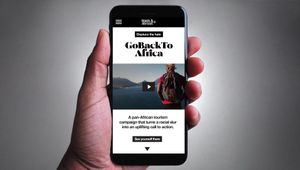
Poignant Drug Free Kids Canada Campaign from FCB/SIX Crashes Into Reality

Horrific crashes. Mangled vehicles. Broken families left to pick up the pieces. All are images that have been used in anti-drunk and high driving PSAs over the years – yet one of the biggest challenges for advocacy groups is convincing the intended target the message applies to them.
Drug Free Kids Canada is hoping to change that perception with 'The Call That Comes After,' an immersive transmedia experience created by FCB/SIX that combines online elements with a real-world mobile component that shockingly – and unexpectedly – drives home the dangers of high driving.
Running through June, the pro bono campaign is intended to start a conversation between parents and teens about the dangers of driving high, using a device central to teens’ lives: their phone.
The journey begins at TheCallThatComesAfter.com, where parents create a custom video for their teen. They are asked to input their child’s name and mobile number, as well as the name or nickname they use for a parent on their mobile device (eg: 'mom').
A video is then sent to the intended recipient (their teenage child), showing a group of likeable teens that make the fateful decision to drive after smoking marijuana. The video culminates with a crash, followed by a series of frantic texts from a parent asking if they are okay.
The message then makes an unexpected jump to real-life as the same increasingly frantic messages begin appearing on the teen’s phone, abruptly transforming them from a passive viewer to an active participant in the narrative. The synchronicity of the user experience is achieved through the unprecedented integration of five technology platforms: IBM’s Marketing Cloud, Oracle Marketing Cloud, SMS, YouTube and an on-demand video rendering engine.
Studies show that driving high nearly doubles the risk of an accident, but a recent study commissioned by DFK Canada found that nearly one third (32%) of teens feel driving high is not as risky as drunk driving, while one in four high school seniors say they have ridden in a car with a high driver.
“Starting a conversation is the most important step parents can take toward helping their children make better life choices,” says Drug Free Kids’ Executive Director, Marc Paris. “Education and ongoing communication are essential.”
The Canadian Association of Chiefs of Police Drug Abuse Committee supports this campaign. “Recent studies have shown that youth do not believe drug impaired driving poses the same risks as driving under the influence of alcohol,” says Mike Serr, Co-Chair, of the Drug Advisory Committee. “As we move towards legalising marijuana it is more important than ever to correct this misconception. We applaud Drug Free Kids Canada's innovative campaign which will generate dialogue and awareness on this important issue.”
“Research shows that parents are one of the biggest influence on their kids when it comes to drug abuse, so we took an approach of reaching out to parents directly to help get the message to their kids, with an innovative use of technology that we thought would best grab their kid’s attention,” adds Vicki Waschkowski, Managing Director, FCB/SIX.
The 6.2 million member Canadian Automobile Association (CAA) is also pleased to support this campaign. “It's important that kids get the message that driving high can wreck lives," says Jeff Walker, vice-president of public affairs for CAA. "This campaign combines two of the major influences in teens' lives - social media and their parents - to bring that home."
This project is the embodiment of technology-driven 1:1 work that FCB/SIX believes is the future of advertising. “We delivered on the client’s objectives by integrating all digital communications into one platform,” says Ian Mackenzie, Executive Creative Director, FCB/SIX. “Data capture allowed us to bring real-time personalisation to each recipient, using it to render each video with a highly personalised and targeted message, and to integrate video, e-mail, online and SMS into one seamless experience.”


















